
Canada Initiatives
Environment Commissioner Audits Canada -
|
|||||
Comment |
 |
Premier/Ambassador Doer Changes Stance on Climate ChangeBefore any public knowledge that outgoing NDP Manitoba Premier would soon be Canada's Ambassador to the US Gary Doer changed his 'policy' on climate change. In his speech to the August 2009 national NDP convention in Halifax, Nova Scotia Mr. Doer (who was the first Canadian government leader to endorse the Kyoto Protocol), outlined his new position for the Copenhagen global climate change agreement. While talking about reducing greenhouse gas emissions being "a good thing" Mr. Doer went on to say, "And whether it is the World Trade Organization, the Canada-US trading relationship or the issues of trade in Copenhagen, it will be very important that we do not have a 'Trojan Horse' that eliminates jobs in North America and jobs in Canada in the guise of Climate Change because India and China are not scoped in on an equal basis." The inclusion of China and India 'on an equal basis' in a global climate agreement was an argument traditionally used by the Bush administration - and supported by Canada's current government. This stance has helped to sabotage international negotiations, provoking disagreement amongst nations rather than promoting cooperation. In taking this position, Canada and the US (when led by the Bush-administration) have been choosing to ignore the principles of equity, historical responsibility and the capacity of each country to act that are the basis for the UN Framework Convention on Climate Change and the Kyoto Protocol. In the context of the UN negotiations, this means acknowledging that developing countries and emerging economies are not in the same position including in actual per capita emissions. They cannot be required to take on emissions reductions targets in the same way as developed countries. Moreover, Canada has been advocating for China and India to take on binding emissions cuts despite our own 30% increase since 1990. View Gary Doer's August 14, 2009 speech at the NDP convention in Nova Scotia (see 20:05 to 22:17) |
|
National Round Table on the
Environment and the Economy
 The National Round Table on the Environment and the Economy released its annual response to Canada's "Climate Action Plan", a requirement under Canada's Kyoto Protocol Implementation Act.
The National Round Table on the Environment and the Economy released its annual response to Canada's "Climate Action Plan", a requirement under Canada's Kyoto Protocol Implementation Act.NRTEE's response to the Plan concluded that many of the emission reductions attributed to specific measures and policies are overestimated. The NRTEE indicated that it is insufficient to rely on the annual assessment approach in Canada's KPIA due to short-term focus and unclear definition of emissions.
View NRTEE's July 2009 response to its obligations under the Kyoto Protocol Implementation ActEnvironment Commissioner Reports on Emissions
The Canadian government has overstated greenhouse gas reductions expected from its climate change plans and Environment Canada, the department responsible, will be unable to determine actual emission reductions for each of the measures planned. The criticisms come from a report tabled in the House of Commons May 12, 2009 by Scott Vaughan, Canada's Commissioner of the Environment and Sustainable Development. It follows the Commissioner's February 2009 release of a December 2008 report that was also critical of the government's climate change measures view section below).

By Fred Curatolo larger version
View May 12, 2009 Office of the Auditor General (Commissioner of the Environment and Sustainable Development) press release
 Download 2009 Spring Report of the Commissioner of the Environment and Sustainable Development (PDF)
Download 2009 Spring Report of the Commissioner of the Environment and Sustainable Development (PDF)The second chapter of the 2009 Spring Report of the Commissioner of the Environment and Sustainable Development is an assessment of the government's climate change plans, as required under the Kyoto Protocol Implementation Act. This second chapter examines Environment Canada's 2007 and 2008 climate change plans and notes in particular that:
|
 Download NRTEE Fact Sheet 1: Canadian GHG Emissions (PDF)
Download NRTEE Fact Sheet 1: Canadian GHG Emissions (PDF)
The Pembina Institute, a non-partisan sustainable energy think tank, responded to the Environment Commissioner's report by calling for Canada to signal to the world it is ready to move forward with an ambitious approach to climate change. The Pembina Institute urged Environment Minister Jim Prentice to initiate the legal process required to cap Canadian emissions before the UN climate conference in Copenhagen December 2009.
View May 12, 2009 Pembina Institute press releaseCanada's Emissions Growing
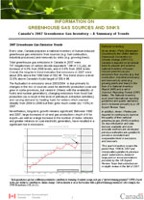
Canada's 2007 Greenhouse Gas (GHG) Emissions Inventory information shows that carbon emissions continue to rise.
The ongoing rise is evidence that calls by civil society groups for Canada to step up action on climate change and strengthen its climate change plan and targets are valid.
Highlights from Environment Canada's 2009 report submitted to the United Nations Framework Convention on Climate Change (UNFCCC), National Inventory Report - Greenhouse Gas Sources and Sinks in Canada 1990-2007:- Canada's 2007 emissions (747 megatonnes of carbon dioxide equivalent) increased by 4.0 percent from 2006 levels and were 26% higher than 1990 levels
- Canada's 2007 emissions were 34% above its Kyoto target (6 percent below 1990 levels)
- The most significant causes of Canada's emissions growth between 1990 and 2007 were: large increases in oil and gas production; a large increase in number of motor vehicles; and greater reliance on coal-powered electricity generation.
View Environment Canada's report summary, Canada's 2007 Greenhouse Gas Inventory
As an Annex I Party (Developed Countries) to the United Nations Framework Convention on Climate Change (UNFCCC), Canada is required on an annual basis to prepare and submit a national inventory of human-induced greenhouse gas emissions from sources (e.g. fuel combustion, industrial processes) and removals by sinks (e.g. growing plants and trees) in the form of a National Inventory Report (NIR) and a set of Common Reporting Format (CRF) tables. (Environment Canada)
 Download Canada's April 17, 2009 submission, National Inventory Report - Greenhouse Gas Sources and Sinks in Canada 1990-2007 (ZIP)
Download Canada's April 17, 2009 submission, National Inventory Report - Greenhouse Gas Sources and Sinks in Canada 1990-2007 (ZIP)View UNFCCC webpage for all National Inventory Submissions
View April 27, 2009 Manitoba Wildlands news item

View May 12, 2009 CBC article
Climate Change Accountability Act Reintroduced
NDP Leader Jack Layton originally introduced the Climate Change Accountability Act as Bill C-377 in October 2006. It passed third and final reading in the House of Commons June 2008 with the support of the Liberal Party of Canada, Bloc Quebecois and NDP. It did not complete Senate consideration before Parliament dissolved for the October 2008 federal election.
The Climate Change Accountability Act is based on a report, The Case for Deep Reductions, by the Pembina Institute, David Suzuki Foundation, and National Round Table on the Environment and the Economy.

By Fred Curatolo larger version
The Act requires the Canadian government to set regulations to attain a medium-term target to bring emissions 25% below 1990 levels by 2020, and a long-term target to bring emissions 80% below 1990 levels by 2050. It creates an obligation on Canada's Commissioner of the Environment and Sustainable Development to review proposed measures to meet the targets and submit a report to Parliament.
View current updates on the status of Bill C-311
Open Letter to Parliament Challenges MPs to Accept Climate Targets
Over thirty Canadian organizations concerned about climate change are urging federal party leaders to again pass Bill C-311, the Climate Change Accountability Act, before Parliament's summer break begins on June 23, 2009.
The February 23, 2009 letter notes the world is more than halfway through a two-year negotiation on the next global climate treaty, set to wrap up in Copenhagen, Denmark December 2009. The letter asserts that the Act "would set national emission targets that represent Canada's fair share of this global effort to prevent dangerous climate change" and signal to the world that Canada will do its part.
Further, the letter points to evidence that Canada can reach a science-based emissions target in 2020 while growing its economy and reminds party leaders that the 2050 target of the Act is identical to President Barack Obama's 2050 target for US emissions. Signatories to the letter include national environmental organizations, faith and labour groups, across seven provinces and the North.
View February 23, 2009 Climate Action Network press release Download February 23, 2009 letter to federal parties to pass Bill C-311 (PDF)
Download February 23, 2009 letter to federal parties to pass Bill C-311 (PDF)Climate Accountability Bill Closer to Law
Canada's Climate Change Accountability Act (Bill C-311) cleared an important hurdle Wednesday April 1, 2009 in the House of Commons. The passing of the Act was largely thanks to a Liberal motion, which changed the timing of the vote, moving it up the agenda, allowing more Parliamentarians to be present for this crucial vote. The Bill will now go to Parliament's environment committee to be discussed and amended, then it will be sent back to the House for 3rd reading. Senate Review is the final step for the Act.
View April 2, 2009 David Suzuki Foundation release
View April 1, 2009 Sierra Club Canada release
View April 8, 2009 Manitoba Wildlands news item

View April 16, 2009 Manitoba Wildlands news item

Commissioner Reports on Climate Programs
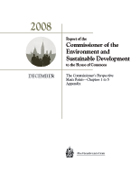 Canada's Commissioner of the Environment and Sustainable Development, Scott Vaughan, tabled his first Report in the House of Commons February 5, 2009. The report states Canada's government cannot demonstrate that certain air emission reductions it has claimed have actually been achieved or will be achieved.
Canada's Commissioner of the Environment and Sustainable Development, Scott Vaughan, tabled his first Report in the House of Commons February 5, 2009. The report states Canada's government cannot demonstrate that certain air emission reductions it has claimed have actually been achieved or will be achieved.View February 5, 2009 Office of the Auditor General of Canada press release
View December 2008 Report of the Commissioner of Environment and Sustainable Development
 Download the Report, Chapter 1 - Managing Air Emissions (PDF)
Download the Report, Chapter 1 - Managing Air Emissions (PDF)The Environment Commissioner's audit looked at examples of four key measures chosen by the federal government to reduce air pollution - regulations, pollution prevention plans, economic measures, and voluntary agreements.
For instance, the report found no evidence to support the emission-reduction claims associated with the government's $1.5-billion clean-air and climate-change trust fund and the $365-million public-transit tax credit. The trust fund was created by the Canadian government in 2007 as part of its Turning the Corner climate change plan.
View the March 2008 report update Turning the Corner: Regulatory Framework for Industrial Greenhouse Gas EmissionsView February 5, 2009 CTV.ca article
View February 5, 2009 Globe and Mail article
The Pembina Institute, a non-partisan sustainable energy think tank, response to the Environment Commissioner's report offered solutions to ensure the federal government is more accountable regarding its climate change programs and initiatives.
"To prevent this from happening again, the government should be required by law to state the expected emission reductions every time programs to cut pollution are announced in the budget. And funding for provincial or municipal initiatives must be accompanied by accountability mechanisms, to ensure both that expected emission reductions occur, and that they are in addition to what would have happened without the funding."
View February 5, 2009 Pembina Institute press releaseCTV, Globe and Mail, Pembina Institute
FAQ About Climate Change - Update
 Canadians frequently ask questions that indicate considerable public confusion about many aspects of climate change science. Some of this confusion stems simply from the fact that the climate system is extremely complex. It is a significant challenge for anyone not reading the primary scientific literature on an ongoing basis to know what to consider 'sound science' and what not.
Canadians frequently ask questions that indicate considerable public confusion about many aspects of climate change science. Some of this confusion stems simply from the fact that the climate system is extremely complex. It is a significant challenge for anyone not reading the primary scientific literature on an ongoing basis to know what to consider 'sound science' and what not.This report is based on fundamental, well-accepted principles on the highly acclaimed international science assessment reports of the Intergovernmental Panel on Climate Change (IPCC), and on recent peer-reviewed scientific papers. This 2008 update also includes results from the many new papers and reports published since then, particularly the recently released Fourth Assessment Report of the IPCC, published in 2007.
View Environment Canada's FAQ about the Science of Climate Change - 2008 update Download FAQ about the Science of Climate Change - 2008 update (PDF)
Download FAQ about the Science of Climate Change - 2008 update (PDF)2008 Federal Election - Climate Materials
Health Canada Assesses Climate Change Risks
 In July 2008, Health Canada quietly released a report assessing research on the health risks posed by climate change.
In July 2008, Health Canada quietly released a report assessing research on the health risks posed by climate change.View July 31, 2008 Health Canada press release
The report is the first comprehensive assessment of health vulnerabilities to climate change in Canada, providing an "up-to-date synthesis of knowledge on how the health of Canadians is affected by our climate today, and what may lie ahead under future climate change."
Health Canada has not made the full report publicly available on its website, but a scanned copy of the full report can be found elsewhere on the web.
 Download the July 2008 report, Human Health in a Changing Climate: A Canadian Assessment of Vulnerabilities and Adaptive Capacity (PDF)
Download the July 2008 report, Human Health in a Changing Climate: A Canadian Assessment of Vulnerabilities and Adaptive Capacity (PDF)Climate Action for Canadian Cities
 A total of 168 Canadian communities and cities have joined the Federation of Canadian Municipalities' Partners for Climate Protection (PCP) program. The PCP program is a network of Canadian municipal governments committed to reducing greenhouse gases and acting on climate change. PCP is the Canadian component of International Council for Local Environmental Initiative's (ICLEI) Cities for Climate Protection (CCP) network.
A total of 168 Canadian communities and cities have joined the Federation of Canadian Municipalities' Partners for Climate Protection (PCP) program. The PCP program is a network of Canadian municipal governments committed to reducing greenhouse gases and acting on climate change. PCP is the Canadian component of International Council for Local Environmental Initiative's (ICLEI) Cities for Climate Protection (CCP) network.Communities commit to developing a local action plan and reducing greenhouse gas (GHG) emissions by 20 to 50 Mt from municipal operations and community-wide initiatives. The PCP is based on a five-milestone framework used to guide communities in GHG reduction:
- Creating a greenhouse gas emissions inventory and forecast
- Setting an emissions reduction plan
- Developing a local action plan
- Implementing the local action plan or a set of activities
- Monitoring progress and reporting results
Cities across Canada have joined the PCP program and developed their own Climate Change Action Plan with individualized goals. Examples include:
Vancouver's goal is to reduce GHG emissions to 33 percent below current levels by 2020 and 80 percent below 1990 levels by 2030. The City has Climate Change Action Plans for City operations and community action.
 Download Vancouver's Community Climate Change Action Plan: Creating Opportunities (PDF)
Download Vancouver's Community Climate Change Action Plan: Creating Opportunities (PDF)
 Download Corporate Climate Change Action Plan for the City of Vancouver (PDF)
Download Corporate Climate Change Action Plan for the City of Vancouver (PDF)
Calgary's Plan sets out a corporate target to reduce the City's GHG emissions to 50 percent below the 1990 level by 2012.
 Download Calgary's Corporate and Community Outlook on Climate and Air Quality Protection, 2006 (PDF)
Download Calgary's Corporate and Community Outlook on Climate and Air Quality Protection, 2006 (PDF)
Regina's Climate Plan sets out GHG reduction by retrofitting facilities, using efficient street lighting, and converting 70 vehicles to natural gas.
View Regina's Community Greenhouse Gas Emissions Reduction Action Plan
Winnipeg's Climate Change Action Plan aims to bring civic emissions down to 69,500 tonnes or a 20 percent reduction from 1998 levels by 2012.
 Download Winnipeg's Climate Change Action Plan, 2006 (PDF)
Download Winnipeg's Climate Change Action Plan, 2006 (PDF)
Yellowknife faces unique challenges with CO2 emissions almost two-times the national average with nearly 80 percent of emissions a result of space heating. Their Community Energy Plan aims to reduce emissions by 20 percent by 2014.
 Download Yellowknife Community Energy Plan, 2007 (PDF)
Download Yellowknife Community Energy Plan, 2007 (PDF)
Montreal's Corporate Action Plan sets actions for vehicles, processes, buildings, and sharing of information. Corporate greenhouse gas emissions target is 20 percent by 2012 based on 2002 emissions.
 Download Montreal - Climate Protection Corporate Action Plan (PDF)
Download Montreal - Climate Protection Corporate Action Plan (PDF)
Halifax's plan reduces greenhouse gas emissions from municipal operation by 20 percent from 2002 levels by 2012, and focuses on energy reduction in buildings. homes and promoting alternative transportation.
 Download Halifax - HRM Climate SMART Community Action Guide to Climate Change and Emergency Preparedness, 2006 (PDF)
Download Halifax - HRM Climate SMART Community Action Guide to Climate Change and Emergency Preparedness, 2006 (PDF)
Canada Still Overestimating GHG Reductions
for Kyoto Period: NRTEE
 On August 1, 2008 The National Round Table on the Environment and the Economy (NRTEE) released its evaluation of the federal government's (Environment Canada) latest greenhouse gas (GHG) reduction plan under the Kyoto Protocol Implementation Act.
On August 1, 2008 The National Round Table on the Environment and the Economy (NRTEE) released its evaluation of the federal government's (Environment Canada) latest greenhouse gas (GHG) reduction plan under the Kyoto Protocol Implementation Act.View NRTEE's webpage for Obligations Under Kyoto Protocol Implementation Act
The NRTEE is obligated to undertake research and advise the Environment Minister on the likelihood the proposed policies and measures will achieve forecasted emissions reductions stated in its GHG reduction plan within 60 days of receiving the government's plan. The NRTEE must also provide advice as to the likelihood that these policies and measures will enable Canada to meet its obligations under the Kyoto Protocol.
Similar to 2007, the NRTEE concluded that the federal government is likely overestimating emissions reductions that will occur as a result of almost all plan initiatives during the Kyoto Protocol commitment period (2008-2012).
For instance, the NRTEE notes there are problems with accounting for and presentation of emission reductions attributed to the technology fund. Although emission reductions will occur as a result of the technology fund, for the most part these will occur outside the 2007-2012 forecast period. Emission reductions should be accounted for in the year they will likely occur and not in the year the contribution is made to the technology fund.
The NRTEE also indicates the federal government has not given enough consideration to issues of free-ridership, rebound effects, and whether stated emissions reductions would have occurred in the absence of the program/initiative (additionally). As a result, it is likely emissions reductions attributable to these measures are overstated.
The NRTEE report also suggests there is uncertainty whether or not the Regulatory Framework for Air Emissions will result in significant emissions reductions in the Kyoto timeframe.
The NRTEE gave the federal government credit for efforts to improve on its 2007 plan. The NRTEE acknowledged that, overall, the 2008 plan is more transparent and a more accurate representation of projected emission reductions. Other improvements include provision of integrated modeling results and more detail and information on assumptions regarding forecasts and policy measure.
The Kyoto Protocol Implementation Act (KPIA), which received Royal Assent June 2007, stipulates that each year the Government of Canada must prepare a Climate Change Plan describing measures and policies it enacted to meet its obligations under the Kyoto Protocol.
The government's first plan was released September 20, 2007 (see section below, NRTEE Slams Government's Kyoto Act Plan). The government's second plan was released May 31, 2008.
 Download May 2008 Environment Canada report, A Climate Change Plan for the Purposes of the Kyoto Protocol Implementation Act (PDF)
Download May 2008 Environment Canada report, A Climate Change Plan for the Purposes of the Kyoto Protocol Implementation Act (PDF)View July 2008 Response NRTEE to its Obligations Under the Kyoto Protocol Implementation Act: HTML or PDF
View Appendices for July 2008 NRTEE to its Obligations Under the Kyoto Protocol Implementation Act
To help the government improve its forecasting methodology and governance, the NRTEE has recently examined how other industrialized countries approach emissions forecasting. The results can be found in its Greenhouse Gas Emissions Forecasting - Learning from International Best Practices report, released along with its 2008 Kyoto Protocol Implementation Act Response.
View 2008 NRTEE report, Greenhouse Gas Emissions Forecasting - Learning from International Best PracticesNew Legislation Makes GHG Cuts Mandatory
 Bill C-377, An Act to ensure Canada assumes its responsibilities in preventing dangerous climate change (otherwise known as the Climate Change Accountability Act) was passed in the House of Commons June 4, 2008, despite opposition by the minority Conservative government.
Bill C-377, An Act to ensure Canada assumes its responsibilities in preventing dangerous climate change (otherwise known as the Climate Change Accountability Act) was passed in the House of Commons June 4, 2008, despite opposition by the minority Conservative government.View BILL C-377, Act to ensure Canada assumes responsibilities in preventing dangerous climate change
Canadian environmental groups applauded the passage of the legislation, hailing at as "an important step towards deep reductions of greenhouse gas emissions".
The Climate Change Accountability Act is a private member's bill tabled by NDP leader Jack Layton. It requires Canada to cut greenhouse gas emissions by 25% from 1990 levels by 2020, and by 80% by 2050. These targets are in line with levels scientists say are needed to avoid dangerous climate change, and the law is based on the findings of the Nobel Prize winning Intergovernmental Panel on Climate Change. Under the Act, the federal government will also be required enact regulations and take other measures to meet these targets.
Bill C-377 was the subject of controversy as it went through the House of Commons process to become law. Conservative Members of Parliament filibustered the House of Commons Standing Committee on the Environment and Sustainable Development for over 17 hours as it undertook to review the proposed legislation.
View House of Commons Standing Committee on the Environment and Sustainable Development on Bill C-377
View Climate Action Network Canada press releases about Bill C-377:
June 5, 2008, April 9, 2008, April 7, 2008.
2 Degrees Celsius Limit for Global Warming -
Kyotoplus and Government of Canada Memos
 Environmental non-government organizations and civil society groups have been urging governments around the world to limit climate change to less then 2 degrees Celsius (2°c) globally. In Canada, a coalition of over 20 Canadian public interest groups launched the Kyotoplus campaign, designed to mobilize public support for an urgent solution to the global warming crisis.
Environmental non-government organizations and civil society groups have been urging governments around the world to limit climate change to less then 2 degrees Celsius (2°c) globally. In Canada, a coalition of over 20 Canadian public interest groups launched the Kyotoplus campaign, designed to mobilize public support for an urgent solution to the global warming crisis.The initiative is premised on widely accepted scientific evidence, which demonstrates that to prevent catastrophic climate change impacts, the global average temperature increase above pre-industrial levels must be kept below 2°c.
Manitoba Wildlands is a member group of the Kyotoplus campaign.
Visit Kyotoplus website
Sign Kyotoplus petition
In response to a Freedom of Information request to the Government of Canada for "All documents or analysis prepared concerning a '2 degree Celsius' threshold limit for global warming (Time period: Jan. 1, 2006 - August 28, 2007)", the Government of Canada provided information concerning briefing material prepared on the issue.
 Download February 25, 2008 Environment Canada briefing memos (PDF)
Download February 25, 2008 Environment Canada briefing memos (PDF)Canada's GHG Regulatory Framework
On March 10, 2008 the Government of Canada published details of Turning the Corner, its regulatory framework for greenhouse gas emissions, originally announced April 26, 2007 as part of Turning the Corner (its 'action plan' to reduce GHG emissions and air pollution).Proposed greenhouse gas regulations are expected to be published in the Canada Gazette later this year, and regulations finalized in 2009 to come into force on January 1, 2010.

By Fred Curatolo larger version
View March 10, 2007 Government of Canada press release View March 2008 Canadian Government Regulatory Framework for Industrial Greenhouse Gas Emissions View other documents from Canadian Government's March 10, 2008 announcement Source: Government of Canada
Canada's GHG Regulatory Framework Criticized The Sierra Club Canada issued its own response, saying the newly released details of the federal government's regulatory framework represent a missed opportunity for improving the government's inadequate approach to climate change.
The Sierra Club Canada issued its own response, saying the newly released details of the federal government's regulatory framework represent a missed opportunity for improving the government's inadequate approach to climate change. The regulatory framework employs an intensity-based rather than a cap and trade emissions system that places an absolute limit on emissions. Most large-scale emissions trading systems in the world, including the EU GHG emissions trading system, and the main air pollution trading systems in the US, are cap and trade systems. The updated version of Canada's regulatory framework retains the national target of 20% below 2006 by 2020; a target that falls short of what the science says is needed. Canada was part of the consensus in Bali December 2007 at UN Climate Change Talks, which recognizes that rich nations need to cut their greenhouse gas pollution by 25% - 40% below 1990 levels by 2020. The Federal government's announcement delays emissions reductions from new coal plants and tar sands projects by only requiring those coming into operation in 2012 or after to reduce emissions by 2018 at the earliest. The government's projections show its timeline for targets will allow oil sands companies to nearly triple their emissions by 2017 before dropping once new targets take effect 2018. By exempting facilities that start up before 2012, the federal timeline creates an incentive for companies to bring new oil sands facilities on stream more quickly to "beat the deadline" and avoid the targets. In documents submitted to the UN, the Government of Canada states that "Canada will require new oil sands facilities and coal-fired power generation plants to put in place large-scale carbon capture and storage (CCS) and other green technologies," leaving out that there is no "requirement" that facilities starting up before 2012 are exempt; and that CCS-level targets will only be applied starting in 2018. View March 27, 2008 Climate Action Network Canada press release View March 11, 2008 Sierra Club of Canada press release  Download Pembina Institute Backgrounder, The March 2008 Federal Regulatory Framework for Industrial Greenhouse Gas Emissions Download Pembina Institute Backgrounder, The March 2008 Federal Regulatory Framework for Industrial Greenhouse Gas EmissionsSources: Climate Action Network Canada, Sierra Club of Canada
Climate Plans Across Canada Download the Manitoba Wildlands listing: Climate Change Plans Across Canada Download the Manitoba Wildlands listing: Climate Change Plans Across Canada  (PDF) (PDF)Climate Change Adaptation Overdue in Canada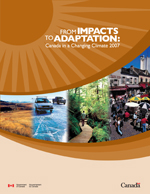 Natural Resources Canada's report From Impacts to Adaptation: Canada in a Changing Climate 2007, a national study that reflects risks and opportunities of climate change for Canada was released by the federal government, after sections were leaked to the media in March, 2008. Canadians had waited since September 2007 for its release. Years of research and input from more than 140 experts across the country, including IPCC contributors, reveals Canada's vulnerability to climate change.
Natural Resources Canada's report From Impacts to Adaptation: Canada in a Changing Climate 2007, a national study that reflects risks and opportunities of climate change for Canada was released by the federal government, after sections were leaked to the media in March, 2008. Canadians had waited since September 2007 for its release. Years of research and input from more than 140 experts across the country, including IPCC contributors, reveals Canada's vulnerability to climate change. "This report is yet another wake up call for a government that has not yet produced a meaningful climate change plan or passed any legislation to protect Canadians from global warming," said Graham Saul, Climate Action Network Canada. The report highlights impacts of greenhouse gas pollution for Canada, region by region and suggests that emission reduction is not enough. Canada must adapt and adjust decisions, activities and thinking to an already changing climate locally and on a national level. Key conclusions from assessment of climate change impacts and adaptation:
 Download NRCAN report, From Impacts to Adaptation: Canada in a Changing Climate 2007 (PDF) Download NRCAN report, From Impacts to Adaptation: Canada in a Changing Climate 2007 (PDF)View March 10, 2008 Climate Action Network article View March 14, 2008 National Post article View March 13, 2008 Green Living Online article Sources: Natural Resources Canada, CBC, Climate Action Network, National Post, Globe and Mail, Canadian Press, Green Living Online |
Canada Climate Initiative Archives
Canada Climate Change Plan
 2002-2014
2002-2014


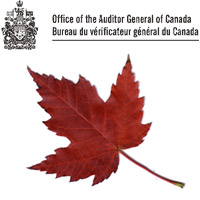 In her first report as Environment Commissioner of Canada, through the Auditor General of Canada offices, Julie Gelfand brings focus to the failure of Canada with respect to climate change initiatives, green house gas regulation, and all targets set for reduction of emissions.
In her first report as Environment Commissioner of Canada, through the Auditor General of Canada offices, Julie Gelfand brings focus to the failure of Canada with respect to climate change initiatives, green house gas regulation, and all targets set for reduction of emissions.
 "Given its commitment to be a world-class regulator, Environment Canada should publish its plans for future regulations to reduce greenhouse gas emissions, such as the oil and gas regulations, with sufficient detail and lead time, so that consultations with interested and affected parties can be transparent and broadly based, and the parties can plan effectively."
"Given its commitment to be a world-class regulator, Environment Canada should publish its plans for future regulations to reduce greenhouse gas emissions, such as the oil and gas regulations, with sufficient detail and lead time, so that consultations with interested and affected parties can be transparent and broadly based, and the parties can plan effectively." 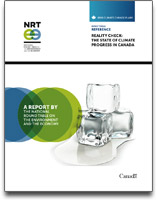 "Canada will not achieve its 2020 GHG emission reductions target unless significant new, additional measures are taken. More will have to be done. No other conclusion is possible," states a recent report by the National Round Table on the Environment and the Economy (NRTEE).
"Canada will not achieve its 2020 GHG emission reductions target unless significant new, additional measures are taken. More will have to be done. No other conclusion is possible," states a recent report by the National Round Table on the Environment and the Economy (NRTEE).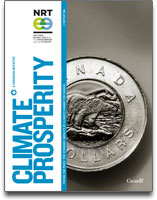 Canada's National Roundtable on the Environment and the Economy (NRTEE) has published a report indicating the potential cost of climate change to Canada. According to the report; Paying the Price: the Economic Impacts of Climate Change for Canada, if greenhouse gases are not reduced and if Canada does not invest to adapt to climate change, the cost to Canada will be in the billions.
Canada's National Roundtable on the Environment and the Economy (NRTEE) has published a report indicating the potential cost of climate change to Canada. According to the report; Paying the Price: the Economic Impacts of Climate Change for Canada, if greenhouse gases are not reduced and if Canada does not invest to adapt to climate change, the cost to Canada will be in the billions. Canada's Environment Minister Peter Kent has set up public review of coal regulations, to take effect in 2015. At the same time Maxim Coal in Alberta is proposing a new coal plant that would pump out three million tonnes of pollution per year. Maxim's is the only new coal power plant being proposed in Canada.
Canada's Environment Minister Peter Kent has set up public review of coal regulations, to take effect in 2015. At the same time Maxim Coal in Alberta is proposing a new coal plant that would pump out three million tonnes of pollution per year. Maxim's is the only new coal power plant being proposed in Canada.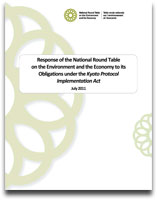 Having walked away from the Kyoto Protocol, Canada's government will not achieve its Copenhagen commitment either, unless more serious action begins, according to new reports by Environment Canada and the National Roundtable on the Environment and Economy (NTREE).
Having walked away from the Kyoto Protocol, Canada's government will not achieve its Copenhagen commitment either, unless more serious action begins, according to new reports by Environment Canada and the National Roundtable on the Environment and Economy (NTREE). The Canadian government admitted that it deliberately left out data indicating greenhouse gases from the tar sands in the 2009 National Inventory Report (NIR) required under the United Nation Framework Convention on Climate (UNFCC) and submitted to the United Nations May 2011.
The Canadian government admitted that it deliberately left out data indicating greenhouse gases from the tar sands in the 2009 National Inventory Report (NIR) required under the United Nation Framework Convention on Climate (UNFCC) and submitted to the United Nations May 2011. Canada was the only nation to submit late emissions data as required by international law under the United Nations Framework Convention on Climate. Environment Canada claims the report was final, but was not been submitted because of the 2011 Canadian General Election.
Canada was the only nation to submit late emissions data as required by international law under the United Nations Framework Convention on Climate. Environment Canada claims the report was final, but was not been submitted because of the 2011 Canadian General Election.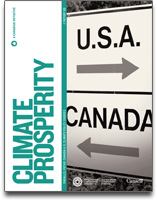 It makes economic and environmental sense for Canada to set its own climate policies now rather than waiting for the U.S. to introduce its system to control greenhouse gas emissions, says a new report, Parallel Paths: Canada-U.S. Climate Choices, by Canada's National Round Table on the Environment and the Economy (NRTEE).
It makes economic and environmental sense for Canada to set its own climate policies now rather than waiting for the U.S. to introduce its system to control greenhouse gas emissions, says a new report, Parallel Paths: Canada-U.S. Climate Choices, by Canada's National Round Table on the Environment and the Economy (NRTEE).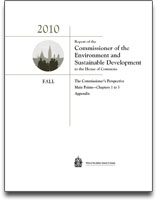 Scott Vaughan, Canadian Commissioner of the Environment and Sustainable Development, examines three topics in details in his 2010 Fall Report:
Scott Vaughan, Canadian Commissioner of the Environment and Sustainable Development, examines three topics in details in his 2010 Fall Report: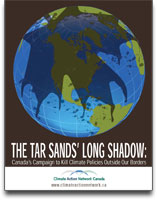 Documents obtained through freedom of information requests by the Pembina Institute, Natural Resources Defense Council, and Climate Action Network Canada reveal that Government of Canada officials are systematically trying to kill clean energy and climate change policies in other countries while promoting the interests of oil companies. The findings are contained in a new report, The Tar Sands' Long Shadow, released by Climate Action Network Canada, a network of over 75 of Canada's leading non-governmental organizations.
Documents obtained through freedom of information requests by the Pembina Institute, Natural Resources Defense Council, and Climate Action Network Canada reveal that Government of Canada officials are systematically trying to kill clean energy and climate change policies in other countries while promoting the interests of oil companies. The findings are contained in a new report, The Tar Sands' Long Shadow, released by Climate Action Network Canada, a network of over 75 of Canada's leading non-governmental organizations.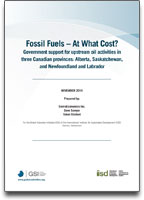 Two recent reports outline the subsidies provided by Canada's federal and provincial governments towards fossil fuel production.
Two recent reports outline the subsidies provided by Canada's federal and provincial governments towards fossil fuel production.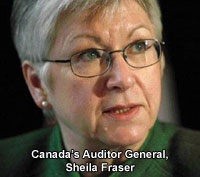 The call for concrete information about the costs of health care, including in the face of climate change impacts, came from Sheila Fraser, Auditor General of Canada.
The call for concrete information about the costs of health care, including in the face of climate change impacts, came from Sheila Fraser, Auditor General of Canada. Canada's provincial and territorial leaders met in Winnipeg for Council of the Federation (COF) session August 4-6, 2010. Climate Action Network Canada (CAN-RAC) organizers were in Winnipeg and in collaboration with the David Suzuki Foundation released a brief outlining: the top five provincial actions and commitments, the five most misguided provincial actions, and the top five priorities to tackle climate change.
Canada's provincial and territorial leaders met in Winnipeg for Council of the Federation (COF) session August 4-6, 2010. Climate Action Network Canada (CAN-RAC) organizers were in Winnipeg and in collaboration with the David Suzuki Foundation released a brief outlining: the top five provincial actions and commitments, the five most misguided provincial actions, and the top five priorities to tackle climate change.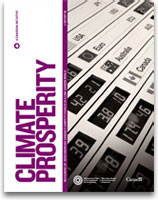 The National Round Table on the Environment and the Economy (NRTEE) released Measuring Up: Benchmarking Canada's Competitiveness in a Low-Carbon World, as the first in a series of seven reports examining how Canada can prosper through the economic risks and opportunities of climate change.
The National Round Table on the Environment and the Economy (NRTEE) released Measuring Up: Benchmarking Canada's Competitiveness in a Low-Carbon World, as the first in a series of seven reports examining how Canada can prosper through the economic risks and opportunities of climate change. Bill C-311, known as The Climate Change Accountability Act, passed third reading in the Canadian House of Commons May 5th, 2010.
Bill C-311, known as The Climate Change Accountability Act, passed third reading in the Canadian House of Commons May 5th, 2010. The Canadian House of Commons Bill C-311, entitled An Act to ensure Canada assumes its responsibilities in preventing dangerous climate change passed second vote April 14, 2020. The Bill requires the Canadian government to set regulations to bring emissions 25% below 1990 levels by 2020, with a long-term target to bring emissions 80% below 1990 levels by 2050. The Bill moves to a third reading and a vote to adopt the Bill May 5th, 2010. The bill previously passed third reading in House of Commons in 2008 but did not have its Senate vote and died because of the election call.
The Canadian House of Commons Bill C-311, entitled An Act to ensure Canada assumes its responsibilities in preventing dangerous climate change passed second vote April 14, 2020. The Bill requires the Canadian government to set regulations to bring emissions 25% below 1990 levels by 2020, with a long-term target to bring emissions 80% below 1990 levels by 2050. The Bill moves to a third reading and a vote to adopt the Bill May 5th, 2010. The bill previously passed third reading in House of Commons in 2008 but did not have its Senate vote and died because of the election call.